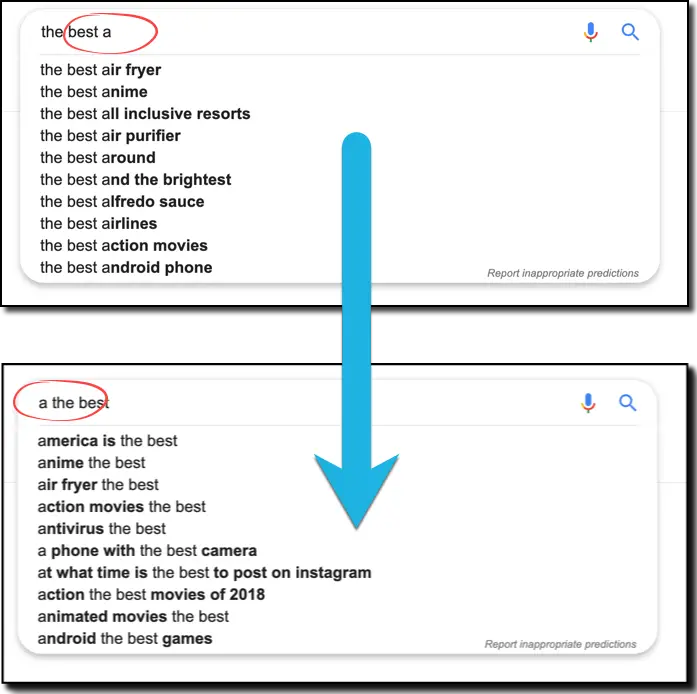
One of the foundations to a successful affiliate website is good keywords. You don’t need to do keyword research to make money in the affiliate space, but it sure as hell helps a lot.
Finding good keywords means that you can focus your time on search terms that will get you traffic and sales. More importantly (in my opinion), this type of research can also help you discover new ideas to write about.
Actually, keywords are really just the main idea of your article. Google and other search engines don’t look for keywords anymore. They don’t look at your content and think, “Hm, I wonder what his keyword is?”.
What they really want to know is the intent of the article, so they analyze your content more holistically.
Go ahead. Try keyword stuffing and see how far it gets you.
So while keywords won’t guarantee your success in ranking, they do help you find a focal point for each article you publish to your website. This topical focus is helpful to both search engines and human traffic.
After all, no person wants to read an article with a title like, “Are Energy Drinks Bad For You?”, then trudge through 500 words about how tea is healthy.
Affiliate Blog VS PPC Campaigns
I’m a blogger, so the main thing I do is research and write information my website. You can also make money as an affiliate marketer by doing paid ads and sending traffic to your affiliate links.
PPC is not something I do, and it’s not something I’m very good at.
I mention this because I talk a lot about how keywords are just a focal point, or an idea, but this mainly applies to writing articles and how they rank with search engine algorithms. If you are doing PPC, finding specific keyword phrases to pay for could be more important.
8 Useful Keyword Tools For Affiliate Websites
These are the keyword tools I’ve used over the years to help me find high traffic, low competition keywords. Use them to discover ideas to write about on your website, and remember to write for humans, not search engines.
1. SEMRush
SEMRush is my favorite keyword tool to use, but it’s also one of the more complicated ones, and it’s definitely not cheap. For a straight up beginner on a budget, you don’t really need it.
For a beginner with a fear of technology, you also don’t need it.
Dang. So why do I even recommend it?
For the price of about a hundred bucks a month you get a huge range of tools to help you grow your website. It’s a search engine suite. Not only do you get a keyword research tool, but you also get the ability to analyze technical aspects of your website, and they’ll give you a weekly report of the good or bad that’s been developing lately.
For example, if someone is trying to do negative SEO on your site, you’ll notice because you’ll see an increase in toxic domains linking to you. Or if there’s a big Google algorithm update and you lose positions, you’ll get a weekly report of that too.
Last year I used SEMRush to identify all my redirect chain loops, and fixed that issue. Then I went through and found all pages without meta descriptions, and all images without alt texts.
Some of that stuff you’ve probably never heard of, and unless you’re super into SEO right now, it won’t make that much of a difference in your progress as an affiliate marketer.
That being said, as a professional affiliate marketing, now, SEMRush is one of the main tool I use to keep up on maintaining technical aspects of my website.
Lastly, I really like their competition research section. Seeing what keywords your competitors rank for is a really easy way to discover high traffic keywords relevant to your niche (SEMRush will also help identify your main competitors).
2. Longtail Pro
I really don’t get what all the hype is about Longtail Pro, but it’s the main keyword tool all the famous niche site creators use. For me, it’s very technical, and many of the metrics it uses don’t really make sense.
For example, it’ll show you the PR (Page Rank) and DA (Domain Authority) for a website, and claim that you should get some links from that website to boost your own rank.
However, Google consistently denies that it uses PR as a ranking factor, and DA is simply a made up metric by a for-profit company (MOZ). There are tons of examples of low DA pages outranking high DA pages, so how is it even useful?
Plus, they put a bunch of arbitrary limits on certain plans. For example, you can only get 800 keywords per 24 hours on the basic plan.
That may seem like way more than you need, but keep in mind you’ll only keep maybe 1/10 keywords you see. A lot of keywords are garbage, and even the garbage counts against your daily allocation of results. Bleh.
It’s not a bad tool. I am just not a fan.
3. Ahrefs
My thoughts on Ahrefs are similar to SEMRush, in that it’s a super useful tool, but only if you have money and time to spend on it. Clocking in at about a hundred bucks for the basic plan, it’s hard to stomach for most new affiliate marketers.
Imagine that – if you got SEMRush and Ahrefs together, you’d be spending $200 a month on keywords. Ew. Gross.
In my opinion, Ahrefs is actually better at discovering keywords. I’ve found more low competition, specific niche keyword ideas using this tool.
Also, they focus more on backlinks and technical analysis of those backlinks that SEMRush. This is one reason why I find less value with Ahrefs – because I don’t do any backlinking.
Along with a steep learning curve, it’s not one that I recommend for newbies, but it’s an option that many successful bloggers, SEOs, and online marketers love.
4. Answer The Public
Finally, a freebie! Answer The Public is a super fast, super insightful way to look up phrases related to a “seed keyword” you type in.
The phrase generator pulls up hundreds of human-sounding questions in seconds, meaning you’ll have a year’s worth of blog post ideas almost instantly.
They’ll be organized into interrogatives (why, where, when, etc), prepositions (for, to, from, etc), and comparisons (vs, and, for). Then you’ll get a list of alphabetical phrases from A to Z. For example, typing in “affiliate marketing” will turn up phrases like:
- affiliate marketing business (letter b)
- affiliate marketing keywords (letter k)
- affiliate marketing verticals (letter v)
- can affiliate marketing make you rich (interrogative CAN)
- will affiliate marketing die (interrogative WILL)
- affiliate marketing with amazon (preposition WITH)
You won’t get any keyword stats, but as I mentioned above, those stats can be misleading. If the phrase turns up, someone is searching for it, so you can bank on someone finding it.
The downside is that you don’t know if it’s one person per month or a thousand people per month. Still, I really like to use this tool for fresh perspective on my niche sites.
5. Mangools
Fun and colorful, Mangools is a great tool for simplifying your keyword research. I haven’t used them for a couple years, so can’t comment on their current state of development, but I did enjoy this tool when I used it.
This is another company that, in my opinion, is creating a false sense of value in their pricing plans by limiting your searches. Come on guys.
6. Jaaxy
The dark horse of this list, Jaaxy is an underused tool in the internet marketing space. It’s an excellent way for newbies to get into keyword research since it simplifies the results into just the must-have stats like traffic, competition, and keyword quality.
Instead of giving you the firehose of 10,000 keyword results, it’ll list just a few of them (you can always to more searches), and the design is really easy to sort though.
Plus, you can track your rank over time for specific keywords, make keyword lists, and do “alphabet soup”, which is a way to maximize keyword possibilities for a single phrase.
It’s not without its issues though. The QSR metric as a way of measuring “true competition” is debated in SEO circles. Also, there are many instances where Jaaxy will say a keyword is easy to rank for, when it definitely is not. I tend to not be afraid of tackling tough competition keywords, so that’s not a big deal for me, but it can be for newbies.
7. Google Autocomplete
Who would have guessed that Google’s billion-dollar archive of search data would be a useful tool for people creating websites? While they won’t tell you everything about what people search for, autocomplete can give some really good insight into what real people are searching for.
In Google’s search bar, type in the beginning of a core phrase you want to research. As you start typing, the sear engine will automatically try to guess what you’re searching for, and there you go. There’s your blog post title.

You can also type words before, and in the middle of your core keyword phrase.

As with Answer The Public, you won’t get any keyword stats to know what’s being searched more or less often. Still, this is a treasure trove of blog titles.
8. Q&A Websites
Though forums and Q&A websites are always listed on these types of lists as a great way to find keywords for your website, most people ignore it. It’s boring, obvious, and it doesn’t feed you the answer.
That’s why it’s a great method to lock down and start leveraging.
Real people are asking questions online, and they turn to Reddit, Quora, and other similar websites because they already did a Google search and the answer didn’t turn up. Nobody likes to wait for an answer, but their question was so specific, that it’s never been written about.
Yes. That’s right. There are answers that don’t exist on the internet yet, and you have the opportunity to be the first!
The downside to this method is that some questions are really dumb, or super specific and won’t have much “repeat” value (getting searched by multiple people each month). You may search through 100 question and just find 2-3 usable blog post titles, but that’s three titles that no one else in the world has.
The excellent (and unique) part is that you get insight into how a real human searches for stuff online. Awkward phrasing, misnaming things, or just frustration and confusion can affect how a person searches, and that comes out in these types of questions.
Mix things up from time to time, get off the keyword tool train that everyone else is riding, and get in the trenches doing some original research!
Keyword Optimization
Keyword optimization doesn’t have to be difficult. I’ve had a lot of success ranking for low competition phrases using super simple tactics like just matching your keyword in the title, URL, and first paragraph. Of course, there’s a lot more that you can do to help rank for your target phrase, but you can get really far with the basics.
